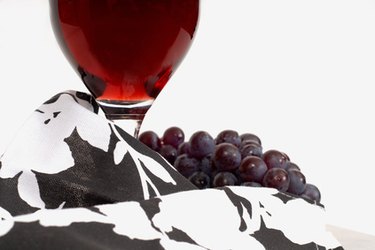Things You'll Need
3 pounds wine grapes
3 pounds granulated sugar
1 1/2 ounces active dry yeast
1 3/4 ounces wheat germ
One gallon purified water
Two-gallon ceramic jar
Long wooden spoon
Cheesecloth
Two-gallon vessel
Rubber gloves

While making wine at home can be a complex process involving lots of specialized equipment, the tradition of wine making goes back to antiquity. The technology needed is as simple as boiling water and crushing grapes. The fermentation of wine requires grapes, yeast, sugar and water. The right conditions and sufficient time for those four ingredients will yield delicious wine.
Step 1
Sterilize the jar and wooden spoon. Pour boiling water in the jar. Stir it with the spoon for several minutes. Pour out the water.
Video of the Day
Step 2
Clean the grapes of any dirt, debris or insects. Remove any rotten or broken grapes. Rinse the grapes in water several times. Spread them out to dry. Rinse off the wheat germ several times spread it out to dry.
Step 3
Pour the grapes into the jar a little at a time. Use a spoon to rupture all the grapes in the jar before adding more of them. Don't completely smash the grapes; make sure each one has its skin broken open. Pour the water over the grapes.
Step 4
Activate the yeast by mixing it with one cup of warm water and two teaspoons of sugar. Mix and wait five minutes. If the mixture bubbles, you were successful. If it does not, try again with water that is not as warm. The ideal temperature is only about 100 degrees Fahrenheit. Pour the active yeast into the jar.
Step 5
Pour the wheat germ into the jar with 1 1/2 pounds of the sugar. Mix thoroughly. Place the lid on the jar so it's airtight. Store the jar in a cool, dry place.
Step 6
Stir the contents of the jar once daily for the next three weeks. Use a clean and dry spoon and completely reseal the jar.
Step 7
Strain the contents of the jar into your secondary vessel through the cheesecloth. Slowly pour off the liquid from the jar and, while wearing the rubber gloves, squeeze the liquid out of the grapes into the vessel. Remove any sediment from the fermenting jar. Strain it all into the vessel.
Step 8
Pour the strained liquid back into the fermenting jar along with the remainder of the sugar. Stir the mixture a few times to mix the sugar. Reseal the jar and replace it in the cool, dry space. Wait at least three more weeks before opening the jar again. The longer you wait, the more alcohol will be produced by the yeast.
Step 9
Skim the liquid off of the surface to drink without mixing or jostling the jar. The sediment will have settled to the bottom; so the wine on the surface should be clear and good. You can strain it again through cheesecloth for clearer wine.
Video of the Day